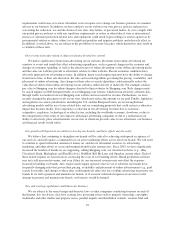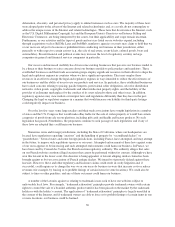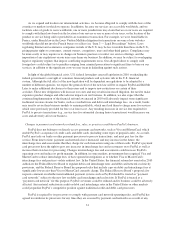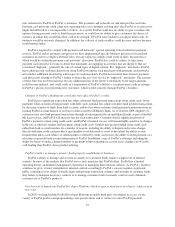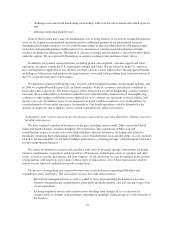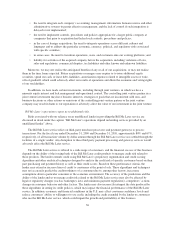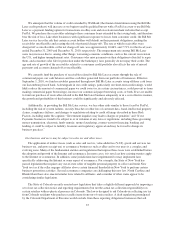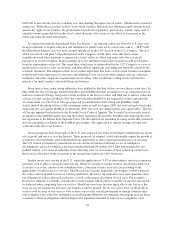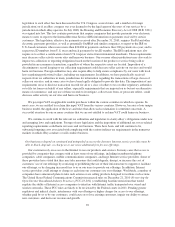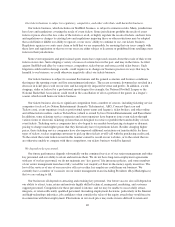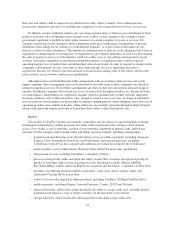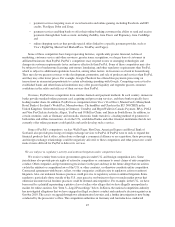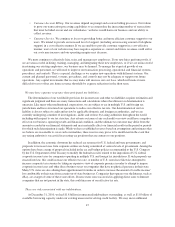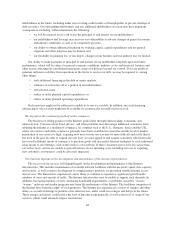eBay 2010 Annual Report Download - page 44
Download and view the complete annual report
Please find page 44 of the 2010 eBay annual report below. You can navigate through the pages in the report by either clicking on the pages listed below, or by using the keyword search tool below to find specific information within the annual report.legislation to such effect has been discussed in the U.S. Congress, several states, and a number of foreign
jurisdictions) or if an eBay company was ever deemed to be the legal agent of the users of our services by a
jurisdiction in which eBay operates. In July 2008, the Housing and Economic Recovery Act of 2008 (H.R. 3221)
was signed into law. This law contains provisions that require companies that provide payments over electronic
means to users to report to the Internal Revenue Service (IRS) information on payments received by certain
customers. The legislation, effective for payments received after December 31, 2010, requires PayPal and other
electronic payments providers, as well as potentially StubHub and similar companies, to report to the IRS on
U.S.-based customers who receive more than $20,000 in payments and more than 200 payments in a year, and to
request tax ID numbers from U.S. users and track payments by tax ID number. The IRS regulations may also
require us to collect a certification of non-U.S. taxpayer status from international merchants. These requirements
may decrease seller activity on our sites and harm our business. One or more other jurisdictions may also seek to
impose tax-collection or reporting obligations based on the location of the product or service being sold or
provided in an ecommerce transaction, regardless of where the respective users are located. Imposition of a
discriminatory record keeping or tax collecting requirement could decrease seller activity on our sites and would
harm our business. Foreign authorities may also require eBay to help ensure compliance by our users with local
laws regulating professional sellers, including tax requirements. In addition, we have periodically received
requests from tax authorities in many jurisdictions for information regarding the transactions of large classes of
sellers on our sites, and in some cases we have been legally obligated to provide this data. The imposition of any
requirements on us to disclose transaction records for all or a class of sellers to tax or other regulatory authorities
or to file tax forms on behalf of any sellers, especially requirements that are imposed on us but not on alternative
means of ecommerce, and any use of those records to investigate, collect taxes from, or prosecute sellers, could
decrease seller activity on our sites and harm our business.
We pay input VAT on applicable taxable purchases within the various countries in which we operate. In
most cases, we are entitled to reclaim this input VAT from the various countries. However, because of our unique
business model, the application of the laws and rules that allow such reclamation is sometimes uncertain. A
successful assertion by one or more countries that we are not entitled to reclaim VAT could harm our business.
We continue to work with the relevant tax authorities and legislators to clarify eBay’s obligations under new
and emerging laws and regulations. Passage of new legislation and the imposition of additional tax or tax-related
reporting requirements could harm our users and our business. There have been, and will continue to be,
substantial ongoing costs associated with complying with the various indirect tax requirements in the numerous
markets in which eBay conducts or will conduct business.
Our businesses depend on continued and unimpeded access to the Internet. Internet service providers may be
able to block, degrade, or charge us or our users additional fees for our offerings.
Our customers rely on access to the Internet to use our products and services. In many cases that access is
provided by companies that compete with at least some of our offerings, including incumbent telephone
companies, cable companies, mobile communications companies, and large Internet service providers. Some of
these providers have stated that they may take measures that could degrade, disrupt, or increase the cost of
customers’ use of our offerings by restricting or prohibiting the use of their infrastructure to support or facilitate
our offerings, or by charging increased fees to us or our users to provide our offerings. In addition, Internet
service providers could attempt to charge us each time our customers use our offerings. Worldwide, a number of
companies have announced plans to take such actions or are selling products designed to facilitate such actions.
The United States Federal Communications Commission enacted rules on December 21, 2010 (Preserving the
Open Internet Broadband Industry Practices [FCC-10-201] ) establishing baseline restrictions that would
regulate the ability of Internet access companies to interfere with Internet traffic transported over wired and
wireless networks. These FCC rules are likely to be reviewed by the Federal courts in 2011. Pending greater
regulatory and judicial clarity, interference with our offerings or higher charges for access to our offerings,
whether paid by us or by our customers, could cause us to lose existing customers, impair our ability to attract
new customers, and harm our revenue and growth.
39


